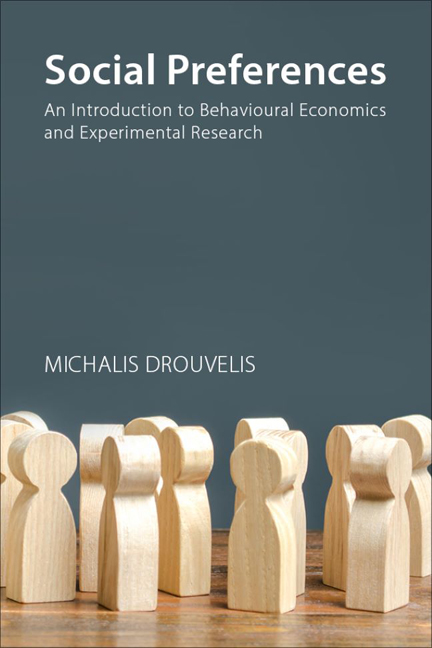Book contents
- Frontmatter
- Contents
- Preface
- 1 Introduction
- 2 Bargaining games
- 3 Trust and gift exchange games
- 4 Public Good Games I
- 5 Public Good Games II
- 6 Leadership
- 7 Public good games with sanctioning I
- 8 Public good games with sanctioning II
- 9 Cross-cultural experiments
- Appendix A Experimental instructions
- Appendix B Practical information
- Notes
- References
- Index
7 - Public good games with sanctioning I
Published online by Cambridge University Press: 22 December 2023
- Frontmatter
- Contents
- Preface
- 1 Introduction
- 2 Bargaining games
- 3 Trust and gift exchange games
- 4 Public Good Games I
- 5 Public Good Games II
- 6 Leadership
- 7 Public good games with sanctioning I
- 8 Public good games with sanctioning II
- 9 Cross-cultural experiments
- Appendix A Experimental instructions
- Appendix B Practical information
- Notes
- References
- Index
Summary
Introduction
Extensive evidence from public good game experiments (also presented in Chapters 4 and 5) provides robust evidence that average contributions decline over time. A natural question that has occupied the interest of behavioural economists is whether we can identify mechanisms that can overturn the decaying pattern. One of the key mechanisms that has been proposed is that of monetary sanctioning, a study which was pioneered by Fehr and Gachter (2000). A motivation for this mechanism stems from earlier findings in public good games showing that people have heterogeneous preferences in that some subjects are selfish and others are conditional cooperators. The lack of a tool that regulates self-interested behaviour makes conditional cooperators behave as if they are selfish since they understand that there exist free riders in the group who do not contribute to the public good. The result is that the interaction between selfish individual and conditional cooperators drives average contributions down. To encourage cooperative norms, Fehr and Gachter (2000) proposed a two-stage public good game, called the “public good game with punishment”. This is the main framework which Chapter 7 is based on.
The structure of the public good game with punishment is as follows. The first stage of this game is identical to a standard public good game where each member in a group is asked to decide how much to contribute to the public good. In the public good game with punishment, an extra phase is added where subjects are informed of the contribution profile of the other group members and has to decide whether to assign punishment (negative) points that have a monetary impact on their total payoff. In particular, the assignment of punishment points is costly both for the punisher and the punished group member. From a standard economic perspective, this implies that a subject, who is purely selfish and only cares about maximizing their own income, will refrain from assigning negative points (because their assignment is costly) in the second stage. As a result, a selfish individual will also contribute nothing to the public good in the first stage of the game.
- Type
- Chapter
- Information
- Social PreferencesAn Introduction to Behavioural Economics and Experimental Research, pp. 99 - 114Publisher: Agenda PublishingPrint publication year: 2021

